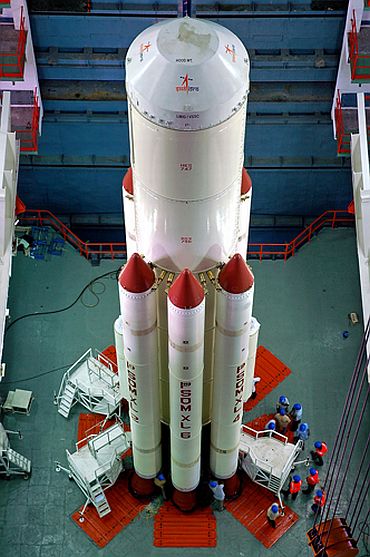 India on Friday successfully launched its latest communication satellite GSAT-12 onboard a powerful variant of homegrown Polar Satellite Launch Vehicle, PSLV-C17, from the spaceport in Sriharikota.
India on Friday successfully launched its latest communication satellite GSAT-12 onboard a powerful variant of homegrown Polar Satellite Launch Vehicle, PSLV-C17, from the spaceport in Sriharikota.
In a textbook launch, Indian Space Research Organisation's workhorse PSLV lifted off from the second launch pad of the Satish Dhawan Space Centre here at 4.48 pm at the end of the 53-hour countdown and placed the 1,410 kg GSAT-12 into orbit about 20 minutes later.
"I am extremely happy to state that the PSVL-C17 GSAT12 mission is successful. The launch vehicle injected the satellite very precisely into the intended orbit," a beaming ISRO Chairman K Radhakrishnan announced.
On its 18th successful mission in a row, the PSLV zoomed into cloudy skies as scientists broke into cheers at the mission control centre here, 90 km from Chennai.
GSAT-12 was injected into an elliptical Transfer Orbit of 284 km perigee (closest point to Earth) and 21,000 km apogee (farthest point to Earth).
Subsequently, the onboard Liquid Apogee Motor would be used to place the satellite in a circular orbit.
GSAT-12, aimed at augmenting the capacity in the INSAT system for various communication services like tele-education, tele-medicine and Village Resource Centres, would be co-located with INSAT-2E and INSAT-4A satellites.
This was the second time in its 19 flights that the PSLV has been used for launching a communication satellite after Kalpana-1 in 2002.
ISRO used the most powerful XL configuration with six extended solid strap-on motors carrying 12 tonnes of solid propellant as against nine tonnes for the standard PSLV for today's flight. A similar configuration was used for launching India's maiden Chandrayaan-1 lunar mission in 2008.
ISRO chose its reliable launch vehicle PSLV in the face of failures of two previous GSLV flights in April and December 2010 that dealt a blow to the missions to place GSAT-5 and GSAT-5P into orbit causing transponder shortage.
Launch of GSAT-12, equipped with 12 Extended C-band transponders, is expected to partly meet the country's growing demand for transponders in a short turnaround time.
The satellite, with a mission life of about eight years, and the PSLV together cost about Rs 200 crore.
Radhakrishnan said Prime Minister Manmohan Singh has extended his warm congratulations to the ISRO team on the successful launch of GSAT-12.
He said in the coming months ISRO would undertake a series of PSLV missions for launching several satellites.
According to him, the GSAT-12 would cater to tele-medicine and tele-education services and 'more importantly' provide support for disaster management.
The ISRO chief also said the space agency had an agenda for a reliable GSLV cryogenic stage (indigenous) "which will happen in a year.
"The ISRO team will pursue this with grit and determination."
India's ambitious home grown cryogenic stage programme has met with failures of two GSLV rockets -- in April and December 2010.
Lauding the efforts of ISRO team, Union Minister of State in PMO V Narayanasamy said this launch would help the country in meeting requirement for more transponders.
ISRO officials said the GSAT-12 and all parameters were 'healthy'.
Image: PSLV-C17










 © 2025
© 2025